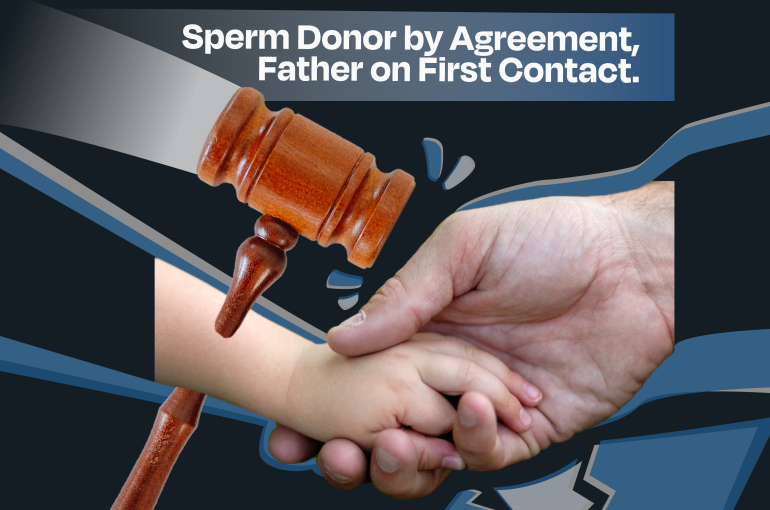Sperm Donor by Agreement, Father on First Contact
A look at OG and Another v CS and Another (GP) (unreported case no 32200/2020, 14-4-2021)
Kollapen J’s judgment opens with a pensive extract on the subject of children, from Kahlil Gibran’s renowned work The Prophet:
“Your children are not your own
They are life’s longing for itself
They come through you but not from you
And though they are with you yet they belong not to you.”
The extract acts as a foreshadowing to the seminal deliberations Kollapen J is called to make when determining who children are and who they belong to, within our legal framework.
A ‘known donor agreement’ has become a viable alternative to the inaccessibility of expensive, anonymous sperm donations from sperm banks. It involves entering into agreements with sperm donors with the aim of impregnation. In this case, a lesbian couple (the Respondents) sought the services of a sperm donor (the Applicant) via a Facebook post. After discussion, the parties entered into a comprehensive sperm-donor agreement whereby, through consensus, the Respondents were established as the legal parents of the donor-conceived child and the sperm donor effectively relinquished any parental rights or responsibilities arising from the conception of the child.
On signing the agreement, the Applicant was in absolute agreement with the terms. However, after interacting with the child on sporadic occasions permitted by the Respondents (including two days after birth), the Applicant developed a bond with the donor-conceived child and resolved thereafter to play an active role in the child’s life. The Respondents’ disapproval of the Applicant’s intentions created conflict between the parties, ultimately resulting in an end to the Applicant’s contact with the child.
As interim relief, the Applicant brought an application to court, seeking a court order granting him access to the child at pre-agreed times. As final relief, he sought rights of guardianship to the child. The Applicant submitted the following points in support of his application:
- On distinct occasions described by the Applicant, the Respondents did not act in the best interests of the child.
- The Applicant inferred a need for a father figure in the child’s life.
- An order granting section 23 guardianship rights would be in the best interests of the child, as the Applicant would contribute love and commitment and would be able to materially contribute to the child.
To address the Respondents’ point in limine that the Applicant lacked locus standi in bringing the application, the court laid out the legal framework when bringing an application in terms of Section 23 of the Children’s Act 38 of 2005 (the “Children’s Act”). Section 23 permits that “any person having an interest in the case, well-being or development of a child may apply to the High Court” for the assignment of rights specified therein. The court also referenced Section 26 of the Children’s Act dealing with the rights of a person claiming paternity, as well as Section 40(3) dealing with the rights of a child conceived by artificial fertilization.
The court held that (regarding the scope of Section 23) the definition of a person who may constitute being a de facto parent cannot be too restrictive or too wide-reaching. The determining factor would be “sufficient interest” in the child, which manifests as a “tangible and clearly demonstrable interest and connection to the child”.
Section 40 of the Children’s Act precludes a sperm donor from relying solely on a biological link with the child when claiming parental rights and obligations, but rather it must be supported with proof of “sufficient interest” in the child. Section 26 of the Children’s Act legally precludes a sperm donor, with the exception of a spouse, of being regarded as the parent of the donor-conceived child. The court explains that the rationale for this preclusion is to facilitate artificial reproduction which would otherwise become an undesirable alternative if the recipient parents are not legally protected.
The court addressed the Applicant’s points with sensitivity towards both parties, considering the nature of the circumstances. The court found the alleged bond between the Applicant and the child was subjective, albeit genuine to the Applicant. On the allegation of the insufficiency of the Respondents to raise a child as a same-sex couple, the court cited a multitude of Constitutional Court decisions to emphasise South Africa’s current non-restrictive notion of ‘family’. The court further held that the Respondents’ generosity in permitting access to the child should not be misconstrued as the Applicant’s entitlement of parental rights over the child.
Ultimately, the court found that the child was well cared for and lived in a family that was both sensitive and responsive to his needs. No evidence was placed before the court to substantiate the finding that contact with the Applicant would be in the child’s best interests, and it was determined that granting contact could create great uncertainty for the child.
The court referred to the 18 months of no contact with the Applicant and found that it did not have any disruptive effect on the child’s life. Although the relationship brought great fulfillment to the Applicant, it was secondary to the child’s parents’ relationship. On considering the Applicant’s commitment to the child, the court found that the commitment materialized within the limited relationship of sporadic contact allowed by the Respondents. Moreover, on providing for the child materially, the court found that while the Applicant occasionally provided the child with gifts, the child’s essential needs were provided for by the Respondents. The court held that the application failed, not on the basis that the Applicant was unsuitable in his commitment to the child, but rather that the relationship the Respondents had created with their child was both worthy and deserving of constitutional protection from outside interference, and that granting the Applicant contact rights would not be in the best interests of the child.


